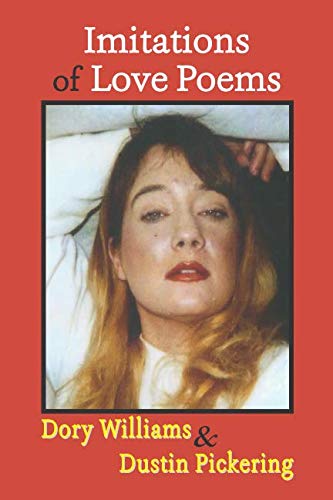Imitations of Love Poems by Dory Williams and Dustin
Pickering
Transcendent Zero Press (2019)
“Imitations of Love Poems” is a joint production by Dory Williams and Dustin
Pickering. Like most marriages, the book is an odd pairing of two quite
different sensibilities. Though both poets write of love and religion, Dory
speaks most often of God and Dustin of thwarted Eros. Dory excels at wonderful
one-liners like “There is
a border at your neck where my lips dare to travel” and “My eyes own a well,
built for me, and you are the water.” Dustin takes a more circumspect approach,
sprinkling his poems with references to the Classical world of thought
populated by Heraclitus, Ovid, and Damocles, and speaking in the voice of
Lyndon Johnson’s grandfather, a Confederate veteran who formed the Populist
Party in Texas and prefigured many of the paradoxes of the Great Society; generally, his lines are longer and
deeper, as in the prose poem “for M. S.”:
“When
your sweet dreams linger long with afterglow, you will fly like a courtesan of
rain through the mysterious sky. Ambivalence is my secret ghost—he tangles your
lips with metaphor. The Magi are hopeless in their search for silence. At
night, you are a shining star that knows the source of light”
Dory is the mistress of the aphorism, “If
you want fame and money without real / Achievement behind it, you’re not greedy
enough.” “Youth is a car sale. The salesman lies. / But we get one look at it
and it's sold.” “With comedy, / you can forget your problems, and fast. /
Unfortunately, it always seems it’s the tragedy that lasts!” Dustin is better
at indirection, as in “Angels in the Dark”:
Something
of passion is here,
listening.
I cannot let it go
because
it holds me in silence.
I had
hopes placed in those lips
that
form the most measureless magic
of your
smile; I wanted to kiss them and hear them
tell me
what the world imparts.
However,
my heart will not stop its ache
and you
cannot stop it even
if
language could cry for me
as I
try, again, in these words
to tell
you my heart cannot leave.
Dory is quite capable of paradox, as in “For
Me, For You, For the World”:
I say
the words, “I Love you”, before I speak.
And I
stay before I’m invited
But Dustin revels in making language itself
a living, mysterious entity, as in two of his poems “For e. b.”:
i have
usurped your river of thought
and
looked up words in your dictionary
without
your permission.
…
you
kiss language, and
let its
free fires fluster and smother
to bite
wisdom in its fearful grip.
While Dory wavers
between desire and uncertainty (“Angels cannot stop true love. / Neither can
demons! / Death cannot stop true love. / But you can!”), Dustin sometimes shows
his promiscuous side, engaging in dialogues not with Dory but with his glittering muses Leonard Cohen
(“They Won’t Forget to Pray: verses in response to ‘So Long Marianne’”) and Amy
Winehouse (“I Cried For You on the Kitchen Floor: lines from ‘You Know I Am No
Good’”).
And so it goes. The Dory section and the Dustin section are like
mismatched lovers, separate and independent under the same covers but deriving
mutual warmth. They do not reflect upon each other, as William Blake did in his
contrasting “Songs of Innocence” and “Songs of Experience.” They follow their
own paths without reference o each other. But, as Dustin reflects,
This is
how worlds happen
One
truth turns into another.
They
lean on each other,
grieving
and burning
like a
small atom dying in friction,
becoming
a grave of itself.

No comments:
Post a Comment
Join the conversation! What is your reaction to the post?